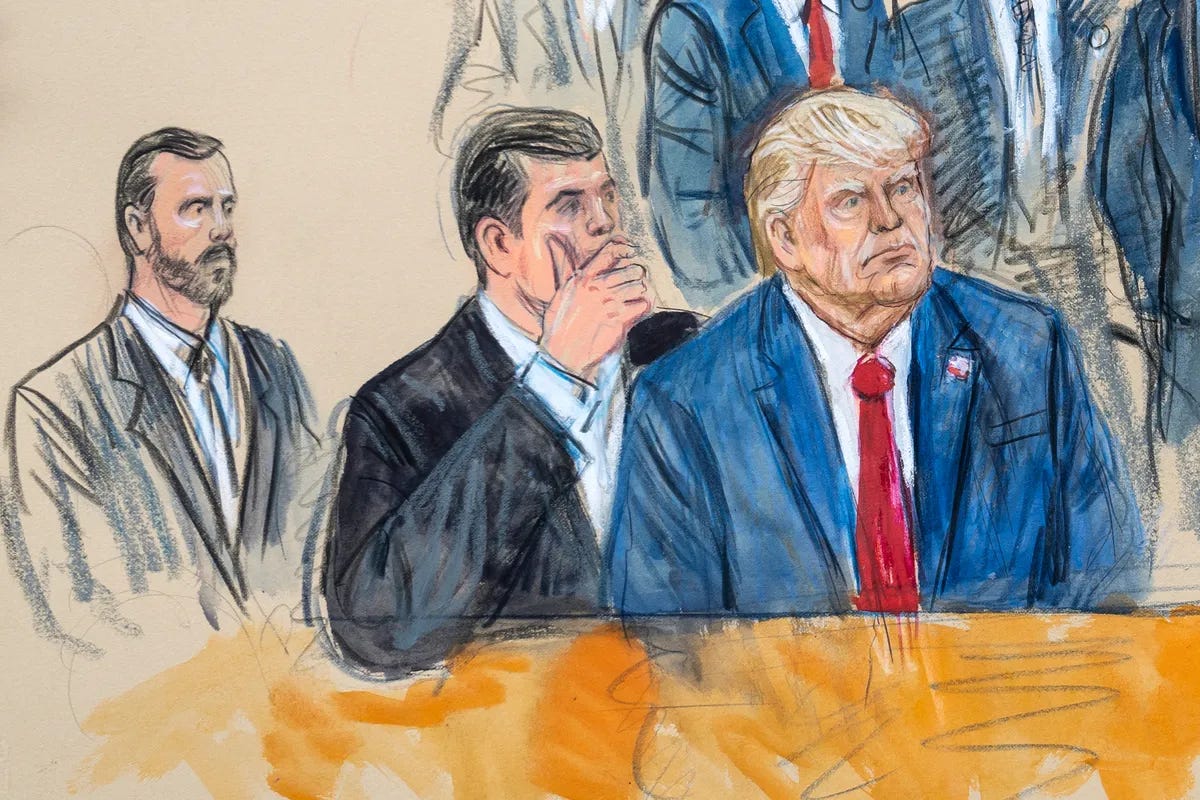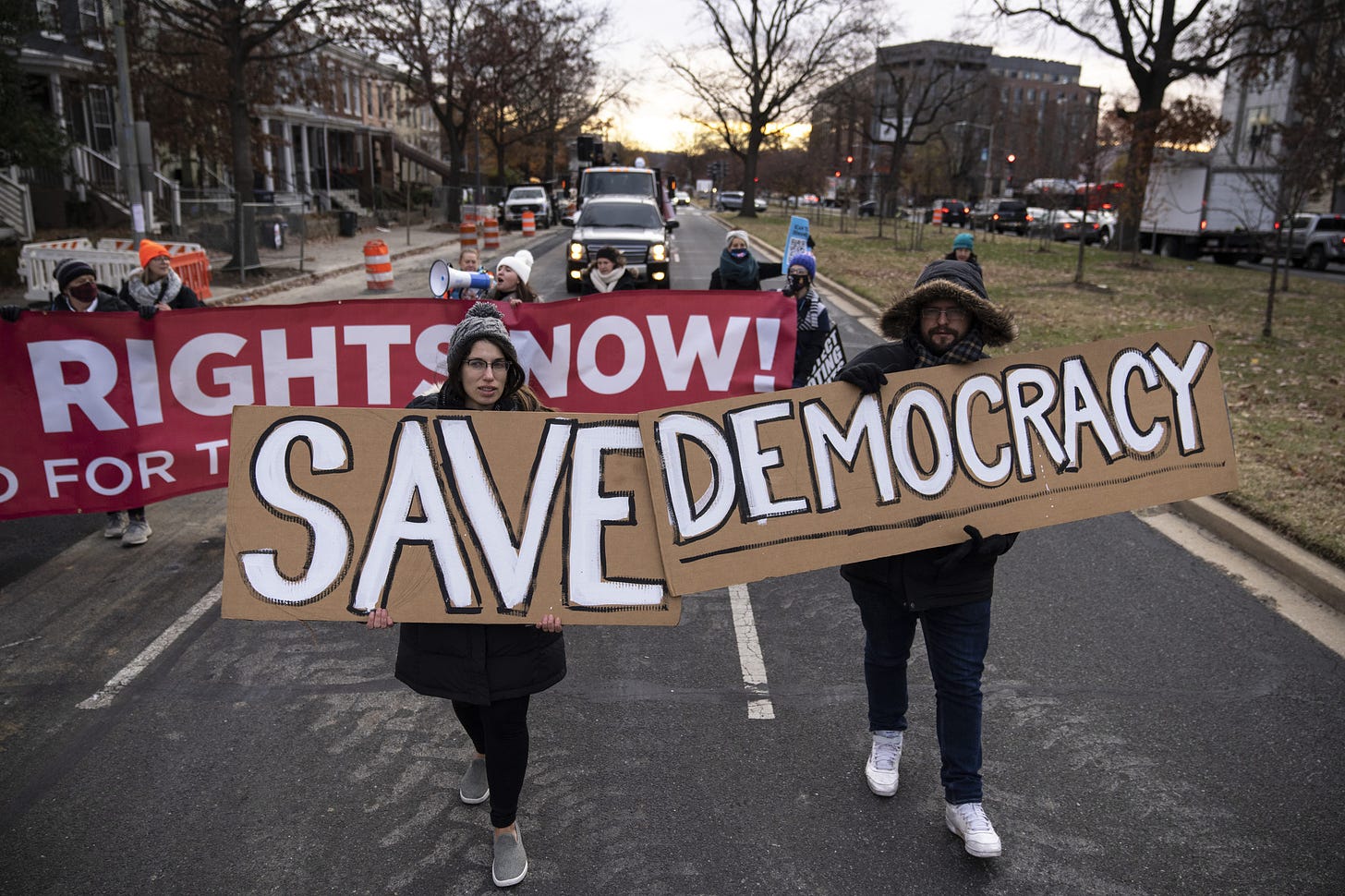On August 1, a Washington, DC grand jury handed down a 4 count indictment of former president Donald J Trump, formally accusing him of defrauding the United States in his bid to overturn the 2020 election. While facing charges was nothing new for the former president, who had already been indicted and impeached twice, in many ways the DC indictment is “the big one,” taking aim directly at Trump’s attempt to subvert democracy and hang onto power. Importantly, this latest indictment accused Trump of conspiring to steal the voting rights of 78 million Americans.
Moving a step closer to holding Trump and his co-conspirators accountable for their attacks on democracy is a welcome development, even if it has taken a frustratingly-long two-and-a-half years. Failing to hold him accountable for attempting to thwart the peaceful transfer of power would cause irreparable harm to our democratic institutions. But in taking this essential step, we find ourselves in the perilous position of re-litigating Trump’s behavior in the aftermath of the 2020 election. And we will be re-litigating that behavior just as Trump transitions from being a defeated former President, to being the defeated former president who is also clear the front-runner in a rapidly approaching GOP primary race.
A number of pundits have suggested that Trump’s best defense is ignorance, convincing a jury that he believed his own lies about the 2020 election. It appears, though, that Trump and his defense team have a different, much more destructive strategy. They are going to use this trial to try to convince a jury – and the American people – that the lies are true, that Trump is the rightful winner of the 2020 election.
After months of Congressional hearings, more than 760 convictions or guilty pleas in January 6 trials and GOP elites including Mitch McConnell, Kevin McCarthey, Nikky Hailey and Tim Scott all conceding that the election was fair, we thought we had put these lies behind us. Even the highly partisan Cyber Ninja audit in Arizona failed to uncover evidence of fraud and Mike Lindell’s ‘Absolute Proof’ was easily debunked.
Trump, for his part, never gave up on claims that the 2020 election was stolen, but over time the focus of his rants on cable TV and posts on Truth Social veered away from election denialism and towards the culture war and other grievances.
Pivoting Back to Election Lies
In the aftermath of his third indictment, Trump and his political allies have pivoted back to 2020, doubling down on assertions of voter fraud and government cover ups and throwing new accusations into the mix. Trump abruptly waived his attorney client privilege claims allowing Bernie Kerik, the disgraced former NYPD Commissioner who led Rudy Guiliani’s investigation into voter fraud, to release 2,000 pages of ‘evidence’ to prosecutors. His defense attorney, John Lauro, made an epic five-stop tour of Sunday-morning talk shows to plead his case, asserting that the President’s claims about election fraud were not lies.
His campaign also released a new attack ad targeting Atlanta, Georgia District Attorney Fani Willis, who appears poised to indict Trump for the fourth time. And longtime Trump supporter Tucker Carlson aired a new interview with former US Capitol Police Chief Steven Sund alleging that the January 6 insurrection was a “cover-up.”
The Trial of the Century
Each of Trump’s previous court appearances has garnered wall-to-wall coverage across the media spectrum with cable news staking out the former president’s every move, from the moment he leaves his home in Mar a Lago or Bedminster through the hearings and to his inevitable after-court campaign rallies. With no cameras allowed inside the courtrooms that airtime has been filled with footage of Trump supporters outside the courthouse, screen grabs of Trump’s increasingly unhinged Truth Social posts, and commentators parsing out the stronger and weaker points in the Special Counsel’s court filings.
Throughout the coverage of the hearings, right-wing outlets have platformed Trump allies parroting claims of a stolen election, while mainstream and left leaning outlets booked commentators to dutifully debunk Trump’s claims about voter fraud. But right, center or left, almost three years after the last vote was cast, everyone across the political spectrum is still somehow talking about whether or not the 2020 election was stolen.
If Trump goes to trial in any one of his outstanding cases before the 2024 election, that trial will dominate the news cycle for a week or longer. If he manages the spectacle effectively (and if there’s one thing we know Trump can do well, it’s manage a spectacle), Trump can spend that week in the spotlight putting Democrats, the 2020 election, and the deep state on trial.
And prosecutors have the deck stacked against them. Anything less than a full conviction on all counts will play as a vindication for Trump, proof that he’s the victim of prosecutorial overreach. Even if Trump is convicted on all counts, he will almost certainly remain free to travel around the country campaigning while his appeals are pending. And a criminal conviction won’t keep him off the ballot in the 2024 election.
A changing landscape and a hardened base
While Trump’s lies haven’t changed over the past two-and-a-half years, the political landscape certainly has. Members of the House Freedom Caucus have transformed from an unruly bunch of insurgents to an unruly bunch of insurgents with control of some of the chamber’s most powerful committees and the ability to unseat the Speaker of the House at the drop of a hat. Culture wars and calls to defund the Department of Justice have seeped into an already challenging budget process and Republicans are poised to force a government shutdown at the end of September.
Fox News, which was once the voice of the far right, is now being flanked to its right by Newsmax, One America News and the now-independent journalist, Tucker Carlson. Twitter, the platform that spent years enabling Trump while only occasionally giving him a slap on the wrist has taken a turn towards free speech absolutism, dropping any pretense of responsible moderation and welcoming in a whole range of racist conspiracy theorists. And Trump now has his own social media platform, Truth Social, with approximately 2 million users, where he can say and do whatever he wants.
Trump remains the clear front runner in the Republican primary field with support of 53% of Republicans in FiveThirtyEight’s polling average. In head-to-head polls against Biden, the two are neck and neck. The portion of the population that believes the 2020 election was stolen has remained relatively steady at around a third since November of 2020. The number dropped slightly in the summer of 2022 but bounced back up by May of 2023.
Trump’s supporters have been with him through two impeachments, an insurrection, the January 6th Committee hearings, and three indictments. It’s unlikely that any of them are going to abandon him now. Certainly, some of the 10,000 Trump supporters who gathered in DC on January 6 believe that the violence at the Capitol was a mistake, but many others believe that the mistake was that they weren’t violent enough.
And two-and-a-half years after January 6, many of the rioters who were convicted for their role in the insurrection have served their sentences and are being released from prison or probation. Some of those returning citizens felt set up or abandoned by Trump and no longer support the former president, but others have been hardened by their experience. Going to jail for a political cause can be a radicalizing experience.
Today, Trump’s MAGA movement controls some of the most important committees in the House of Representatives; it has built a robust media infrastructure without any of the guardrails that moderated Fox News or mainstream social media; it maintains a base of supporters who have proven incredibly loyal, even in the face of major controversies; and it can rely on an army of militants, many of whom have been to battle, and even prison, for the movement.
Trouble Ahead
Trump’s legal troubles are playing out in four distinct jurisdictions and the 2024 Presidential Election will play out in two separate phases (the Republican Party Primary and the General Election) so we can expect to see his continued attack on democratic institutions and norms playing out in a number of different threads. Each of the threads may seem disparate and disjointed, but they’re all aimed at keeping Trump out of jail and in the White House, no matter what it takes.
In the coming weeks and months, Trump and his supporters will continue to attack the prosecution as a Democrat-led overreach aimed at interfering with the 2024 election. We can expect them to float out different arguments as they test their messaging and see what sticks, with a clear eye towards undermining the outcome of the 2020 election AND the 2024 election.
For months a small but growing group of Trump supporters have been holding vigil outside of the DC Jail at what they’re calling “Freedom Corner” to show support for the 40 or so January 6 defendants that are still being held there. When Trump was indicted in DC on August 3rd, that crowd migrated to the federal courthouse to show their support for the former president. As court activity picks up in DC we can expect that grouping to grow and form the nucleus of a grassroots, street presence in support of Trump.
On Capitol Hill, the House Judiciary Committee has already held field hearings in New York City in response to Manhattan DA Alvin Bragg’s decision to indict Trump in the hush money case and House Judiciary Chair Jim Jordan has called Attorney General Merrick Garland to testify before the full committee on September 20th. The Republican’s razor thin majority in the House means that it’s highly unlikely that they will be able to pull off an effort to impeach the Attorney General, but they may attempt to use the power of the purse to influence the Department of Justice. Congress has until September 30th to come to a budget deal or face a government shutdown and there are already calls among some Republicans to clawback funds for a new FBI headquarters, defund the Special Counsel, or cut funding to the Department of Justice more broadly.
If there is somehow a major shift in the Republican Primary race and Trump is not the leading candidate headed into the party’s nominating convention in Milwaukee in July of 2024 we can expect a raucous floor fight, complete with challenges to state delegations, legal wrangling, and very likely Republican on Republican political violence. And as we approach the general election, we should expect the Trump campaign to revive its program of voter suppression, spurious objections to the counting process, and competing slates of electors.
Raising the stakes even more in this election cycle, the deal that averted a default on the national debt only suspended the Debt Ceiling until January 1, 2025. So if Congress doesn’t act sometime between now and the election (and we have no reason to believe that they will act) they will need to come to an agreement that allows the government to pay its debts in the lame duck session.
Defending Democracy
Things are about to get really difficult and there’s no way around that. But there is work that our movements can and should be doing right now to defend democracy. We need to
Take the threats and challenges ahead of us seriously. Many leaders and organizations in our movements made the mistake of laughing off Trump in the lead up to the 2016 election. Then, as the 2020 election approached many of us brushed aside the possibility that there could be a real threat to the peaceful transfer of power. We cannot afford to make that mistake again. The work we do to prepare right now will put our movements in a stronger position to defend democracy in a moment of crisis.
Keep House Republicans out of the courtroom. Congress, and House Republicans in particular, has no role to play in the criminal prosecution of any citizen and this case is no different. Democrats on the House Judiciary Committee need to push back against Jim Jordan’s attempts to use the committee to interfere with any of these cases. And if Republicans push measures to undermine these prosecutions into a budget deal in September, Congressional Democrats and President Biden need to block those efforts at all costs.
Keep an eye out for false balance bias in the media. As Trump’s legal problems dominate the news cycles and he and his supporters continue to make blatantly false claims, many news outlets will be tempted to cover “both sides” of the case. Continually repeating Trump’s lies about the 2020 election, even if it is to explain why they are false, gives those lies room to grow and spread. When media outlets fall into this trap we need to challenge them and demand that they cover these cases more responsibly.
Push prosecutors to hold Trump accountable to the terms of his release. Former President Trump is on supervised release in three jurisdictions. Like any defendant he’s been instructed to avoid communicating with witnesses or tampering evidence; making threatening statements that could intimidate prosecutors, jurors, or witnesses; and properly handle confidential material he’s received as part of the discovery process. If he violates those terms of release, our movements should mobilize to demand that prosecutors ask the judges overseeing the case to place appropriate restrictions on Trump – up to and including pretrial detention – to prevent him from undermining the legal process that is holding him accountable.
Build capacity in our social movements and strengthen our democratic institutions. Fighting against Trump stealing the election – again – is inherently a defensive battle. If we are going to create the change that our communities need to address the real challenges surrounding us - from the climate crisis to run away inequality - we need to invest in building stronger social movements. That means investing in training, mentorship, and skill building; opening the doors to bring new people into our movement spaces; and working together to ensure that our movement organizations truly reflect the world that we want to create.
The threats are very real and the next several months are going to be incredibly challenging. But by rising to the challenge that’s ahead of us and investing in our movements and each other we can emerge from this dark moment in our history with a stronger democracy and a brighter future.







